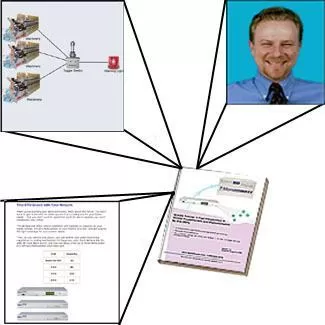Download our free SCADA tutorial.
An introduction to SCADA from your own perspective.
1-800-693-0351
Have a specific question? Ask our team of expert engineers and get a specific answer!
Sign up for the next DPS Factory Training!

Whether you're new to our equipment or you've used it for years, DPS factory training is the best way to get more from your monitoring.
Reserve Your Seat Today"SCADA Guide" is another way of saying "SCADA Tutorial".
Have you been tasked with purchasing, upgrading, or maintaining a SCADA system? Are you expected to make decisions about Intelligent Electronic Devies (IEDs) or Remote Telemetry Units (RTUs)? Do people come to you with questions about SCADA System Masters or mediating SCADA Telemetry to SNMP Masters? Do you fully understand the role of a SCADA system? These are important questions, and even if you're slightly familiar with the operation of a SCADA system, you could be overlooking some key aspects. To fully understand the benefits of a quality SCADA system, you need a high-quality SCADA guide, written by experts, to help you.

For instance, do you know how SCADA Telemetry fits into a Remote Monitoring and Control System? Do you know how to setup network alarm management so that all of your alarms can be viewed in a single place from a single screen? This kind of instantly useful information forms the core of a valuable SCADA guide.
SCADA stands for Supervisory Control and Data Acquisition. It's not a specific type of technology, but instead describes an application. Any system that collects data about the system to control that system is considered a SCADA application. This type of application has two elements; the process or device you want to control and the devices that control the system. A variety of devices and protocols can be used to form a SCADA system, so that you can get the exact functionality that you need.
SCADA is used in a wide variety of industries to control all manner of processes. For instance, they are used to automate water and sewage processes, electric power generation, manufacturing processes, traffic signals, mass transit and more. No matter what your industry is, there is usually always a way to implement a SCADA system in order to automate a process.
Not part of one of the above industries? Fear not! SCADA can be used in many ways. As long as you have a process that needs to be controlled and can be automated, you have a potential use for SCADA. If you're unsure of how SCADA can fit into your business, consider these benefits of a SCADA system:
Still think SCADA isn't for you or your business? Use it to automate tedious manufacturing processes. Use it to switch from one solar panel cell to another when you need power. SCADA has more uses than you can imagine.
To learn more about SCADA, you need a level of information that can only come from engineers with years of experience, not some anonymous tech forum member. If you're trusting the success of your SCADA implementation to the SCADA guide you're reading, it had better contain the best available information.
But, be forewarned! There are a great deal of SCADA guides online that have less than adequate information, written as fact, by someone unknown. Do not rely on anonymous forum posts or questionable websites for vital information. You need correct and relevant SCADA info in a quick format. Only industry experts can provide you with the tools you need to do your job better. When looking for a guide, check to make sure it is written by a reputable person or company with years of experience in SCADA. It is essential that you find a reliable guide with information written by someone with years of experience. An accurate, detailed manual could make all the difference to your company's future (and even your personal career future).
Every page of a SCADA tutorial should have info collected from years of experience. If you're relying on a few sentences from a tech forum, how successful can you really expect to be? You need a SCADA tutorial that will introduce you the basic concepts of SCADA systems, important definitions, and detailed application drawings. Also, it should tell you how a SCADA system could work to increase your company's profit, and troubleshooting techniques that can be applied to common SCADA problems. The processes in a detailed SCADA tutorial will limit human error, lost revenue, and increase the uptime of your operations. Your company will benefit from the info you gain after downloading and reading an intro guide. Knowledge is the key to successful SCADA implementation and management. DO NOT doom yourself to failure by relying on "tips" from those who have never been successful with SCADA.
DPS Telecom engineers have been developing perfect-fit solutions for their clients for over 20 years. In that time, they've accumulated a world-class monitoring knowledge base. Now, part of that knowledge is available to you as an introductory SCADA guide. You'll learn the basics of SCADA, keys to a successful implementation, and costly pitfalls to watch out for.
To see additional information related to a "SCADA Guide", please visit the SCADA Tutorials page.